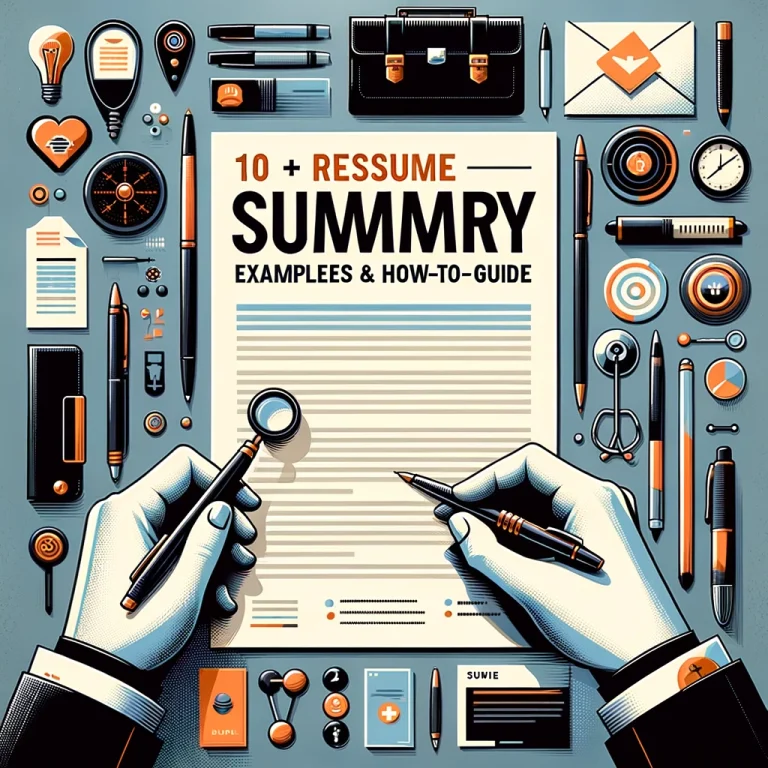Buzzwords to Avoid in Your Resume: Steering Clear of Clichés
Introduction to Buzzwords
Crafting a resume that stands out in a pile of applications is crucial for catching the eye of hiring managers. However, the overuse of buzzwords can diminish the impact of your resume, making it blend in rather than shine. Buzzwords are often vague, lack specificity, and do nothing to distinguish your unique capabilities. This guide will help you identify and replace overused terms with concrete examples that showcase your achievements and skills.
Why Avoid Buzzwords?
Buzzwords make your resume sound like everyone else’s. They can be seen as filler, reducing the effectiveness of your communication and making it harder for employers to understand your true value. Avoiding these terms can help you present a more authentic and compelling narrative of your professional journey.
List of 200+ Buzzwords to Avoid
Here’s a compilation of buzzwords that are often flagged as tired or meaningless by hiring managers, along with suggestions for more impactful alternatives.
Generic Adjectives & Phrases
- Innovative
- Motivated
- Highly qualified
- Hard working
- Team Player
- Results-driven
- Dynamic
- Proactive
- Strategic thinker
- Detail-oriented
- Passionate
- Expert
Overused Action Verbs
- Leveraged
- Managed
- Orchestrated
- Pioneered
- Transformed
- Revolutionized
- Accelerated
- Empowered
- Optimised
- Disrupted
Vague Descriptors
- Synergy
- Thought Leader
- Guru
- Visionary
- Game changer
- Rockstar
- Ninja
- Wizard
- Evangelist
- Genius
Business Jargon
- Bottom line
- Best practice
- Value add
- Core competency
- Think outside the box
- Synergize
- Bandwidth
- Low-hanging fruit
- Move the needle
- Ecosystem
Technological Buzzwords
- Digital transformation
- Big data
- Artifical intelligence
- Machine Learning
- Crptocurrency
- Blockchain
- Internet of things(IoT)
- Virtual reality
- Augmented reality
- Cloud Computing
- Cybersecurity
Alternatives to Common Buzzwords
Replace vague adjectives with specific examples of your accomplishments. Instead of saying you’re a “hardworking team player,” describe a situation where you collaborated on a project and contributed to its success. Use numbers and details to quantify your achievements, such as “Increased sales by 20% through strategic marketing campaigns.”
Impact of Avoiding Buzzwords
By avoiding buzzwords and focusing on specific, measurable achievements, your resume will better capture the attention of hiring managers. It will also make it easier for them to understand the unique value you bring to the table, increasing your chances of landing an interview.

Conclusion: Embracing Clear Communication
Your resume is your opportunity to showcase your professional experience and skills. By avoiding overused buzzwords and opting for clear, precise language, you create a stronger, more memorable first impression. Remember, the goal is to make your resume reflect your individual achievements and work ethic as accurately as possible.
FAQs
Why is it important to avoid buzzwords in a resume?
Avoiding buzzwords in a resume is crucial because they often lack specificity and do not convey your unique skills and accomplishments effectively. Buzzwords are overused terms that have become so commonplace in resumes that they no longer hold significant meaning to hiring managers. They can make your resume seem generic and may suggest that you’re relying on clichés rather than providing concrete examples of your achievements. Furthermore, avoiding buzzwords helps your resume to stand out by focusing on clear, quantifiable accomplishments that accurately reflect your professional experience and capabilities.
How can I describe my skills without using buzzwords?
To describe your skills without using buzzwords, focus on specific, quantifiable achievements and experiences. Use clear and precise language that demonstrates the impact of your work. For example, instead of saying you’re a “team player,” you could say, “Collaborated with a team of 5 to increase project efficiency by 30%.” This approach provides concrete evidence of your skill in teamwork and collaboration. Additionally, tailor your skills to the job description, highlighting how your unique abilities will benefit the potential employer directly.
Can you give examples of strong action verbs to use in a resume?
Strong action verbs provide clarity and strength to your resume, showcasing your accomplishments in a dynamic way. Here are some examples:
- Achieved
- Created
- Developed
- Enhanced
- Improved
- Led
- Negotiated
- Optimized
- Resolved
- Spearheaded
Using these verbs at the beginning of bullet points under your experience section can help make your contributions stand out more vividly to employers.
How do I make my resume stand out without buzzwords?
To make your resume stand out without relying on buzzwords, focus on customization and personalization for the job you’re applying for. Tailor your resume to highlight the skills and experiences most relevant to the job description. Use a clear, professional format that makes your resume easy to read and emphasizes your achievements through bullet points or short paragraphs. Incorporating metrics and specific examples of your successes can also help differentiate you from other candidates. Finally, consider adding a section on relevant projects or volunteer work that showcases your skills in action.
What are some common mistakes to avoid when writing a resume?
Some common mistakes to avoid when writing a resume include:
- Lack of specificity: Failing to provide concrete examples of your achievements.
- Ignoring keywords: Not including keywords from the job description can make your resume less likely to get noticed by Applicant Tracking Systems (ATS).

- Poor formatting: Using an overly complicated or hard-to-read layout can detract from the content of your resume.
- Typos and grammatical errors: These can give a negative impression of your attention to detail.
- Including outdated or irrelevant information: Only include experiences and skills that are relevant to the job you’re applying for.
By addressing these common pitfalls, you can craft a more effective and compelling resume that better showcases your qualifications.
🔴Do you have an ATS (Automatic tracking system) Compliant CV?
🔴Do you have a CV which is globally acceptable?
🔴Do you have professional content in your CV?
✅Get your CV designed and developed today !! Professionally .
Get your Resume reviewed for free by industry experts: Click






